Pride month is over so we are back again at giving straight people life advice. While being feminist your service as a queer person probably do not extend to cishet men and I fully understand that. Same here.
There are shows specifically aimed at us and there are shows which are also aimed at us and still being hella gay. Both type of shows should be watched by any straight person to learn things. Mostly about what it’s like to be queer in this world and how heteronormativity and transphobia is making our lives a million things straight people do not experience.
The thing is: most straight people don’t watch those shows. They are not watching stories and characters not reflecting their lifestyle and opinions. That’s why the majority of straight people who love to watch tv shows haven’t watched POSE but Queer Eye. They don’t want to be challenged by our histories, bodies and culture, they wan’t to be embraced or included. So I’m not recommending those kind of shows. Would be a waste of time.
Thanks to some major shifts in the industry in the last few years partly due to #MeToo and #TimesUp there still is a growing number of TV shows I find especially interesting. Because they showcase the toxicity of heterosexuality and relationships with straight men, examining the patriarchy in our daily lives, straight and queer people alike, and giving hints on how to overcome the rules and restrictions of straight culture. You have to be self-aware to get to the last part but I believe in you, straight women! So let’s get to some feminist food.
1. Dead to Me (2019-), Netflix
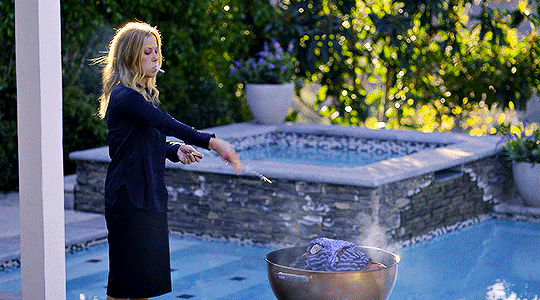
Christina Applegate produces and also stars in this dark comedy about grief and friendship as Jen aka the „white wine vigilante“. Jen grapples with the aftermath of her dead-by-a-hit-and-run husband and being a widowed mother to two boys. She mets Judy in a therapy group and the two become best friends very quickly. Whereas Jen is clearly not dealing with her outright anger and cynicism, Judy seems to be the kindhearted and understanding one supporting Jen and her boys through their grief. Turns out Judy is harboring a dark secret and luring Jen deeper and deeper into her own twisted world.
„Dead to Me“ is heavy loaded with lesbian subtext and an incredible amount of femslash fan fiction tropes but that’s a prize only reserved for the queer audience, sorry straights! Nonetheless it blows over with misandry and the power of female friendship wrapped in hilarious dialogue and superior performances by both Applegate and her co-star Linda Cardellini. The nonchalance of which Dead to Me delivers feminist takes on various timely issues is entertaining and refreshing. A strong candidate for the upcoming award season.
Have I forget to mention that Dead to Me has an all female writing and directing team? And its creator Liz Feldman is a lesbian?
2. Killing Eve (2018-), BBC and AMC
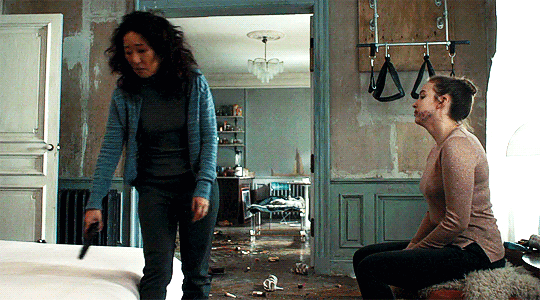
I gushed about this show already last year and Killing Eve’s sophomore season is proving it’s capable of holding the high standards it set with its premiere. The cat-and-mouse spy thriller slash dark comedy with hit woman Villanelle and the MI agent Eve chasing her got even more layered and insane. Eve and Villanelle mirror each other in so many ways you constantly forget that one is a psychopathic killer for hire and the other one is (was?) a highly effective expert on female assassins. Villanelle is still messing with Eve’s professional game as well as with her marriage and her sense of self. But Eve’s got game with Villanelle too.
Killing Eve is unreached with its depiction of two women obsessed with each other and what this relationship unravels within them. It’s charged with erotic tension even the straight eye can catch it. Jodie Comer and Sandra Oh have amazing chemistry and fill their characters with such vibrating authenticity it leaves your mouth open – dry and watery at the same time. The show relies as heavy on their acting performances as well as on its writing and pacing, which is always on point and shockingly funny. Thanks to Phoebe Waller-Bridge and Emerald Fennell who were solely writing the first two seasons.
3. Big Little Lies (2017-), HBO
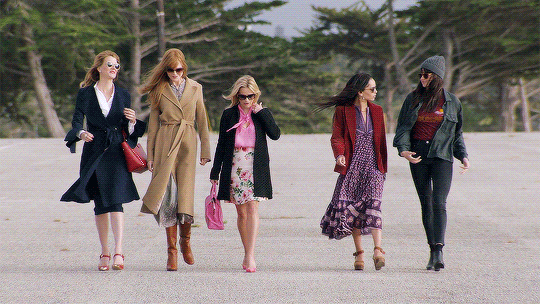
If you know the novel by Liane Moriarty this show is based on you already know the ending of season 1. Not me. As hard as it was to watch every hour-long episode of Big Little Lies‘ first season the finale was as equally satisfying, sappy even: Five women, friends and foes, bonding over a dead man… I mean? What more do you need to make up for rape, sexual assault, domestic violence and the upper class motherhood and heterosexuality of it all?
Tho season 1 is written and directed by two men Big Little Lies caters especially to women’s experiences of violence within intimate relationships and centers their ways of surviving. The cinematography of the show reflects its perspective in a chilling yet visually stunning way. I’m glad Nicole Kidman has undergone cosmetic surgery to an extent it limits her facial expressions because her scenes are often outright triggering and I didn’t want to endure her personal terror more than I already had to.
Season 2 had two very interesting and satisfying additions: Meryl Streep as vengeful and manipulative grandmother and Andrea Arnold as sole director.
4. Sharp Objects (2018), HBO
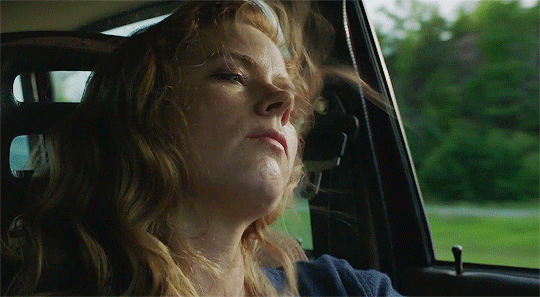
Camille Preaker, journalist and recently checked-out from a psychiatric facility after her roommate poisons and ultimately kills herself, visits her hated hometown to investigate a recent murder case. Unfortunately she stays in her old house with her clearly psychopathic family who continues to emotionally torture her in such subtle ways your blood starts to freeze.
Adult Camille suffers from severe violence and trauma she encountered in her child- and teenhood and we see her abusing alcohol, having flashbacks, emotional outbursts and panic attacks, we witness her heavy dissociating and suicidal attempts, we discover the scars all over her body she gave to herself in order to cope. With the investigations going forward Camilles‘ growing up is paralleled against the fatal violence of her hometown present and it’s made painfully slowly but crystal clear that its residents are entirely responsible for everything bad happening.
Former Big Little Lies director Jean-Marc Vallée also directed Sharp Objects (which is based on the novel by Gillian Flynn and all episodes are written by women). His very unique cinematography is even more apparent in Sharp Objects and it’s kinda creepy how accurately he manages to visualize how trauma does its work on the bodies and within the minds of its survivors from their point of experiencing. Sharp Objects was intended to have one season only but its praise amongst critics opened the discussion for more (like with Big Little Lies before). Thankfully(?) Amy Adams opted out because she didn’t want to do another round within her character Camille. If you watch Sharp Objects you’ll understand.
5. Halt and Catch Fire (2014-2017), AMC
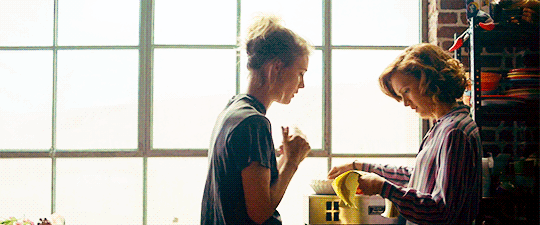
It’s not often you find a show where the sophomore season is exponentially better than its premiere. But here it is: Halt and Catch Fire started circling around „tortured genius“ Gordon and Trump Era infused asshole Joe in the early 80s both eager to build a personal computer together and sell it to IBM or whatever big company is at play in the pre-silicon-valley era. If you’re a little nerdy or nostalgic around the early stages of personal computing and the internet or with the 80s and 90s in general this show will fully satisfy you over the span of four beautifully crafted seasons. But it will also give you hardware engineer Donna and software engineer Cameron, the real geniuses and only capable business women of this show.
HACF has a whole bunch of female writers and directors and I fully blame them for the beauty of Donna’s and Cameron’s relationship the show centers from the beginning of S2 till the end. This quote from a nice review says it all:
Even beyond the importance of representing women in STEM fields, Donna and Cameron’s relationship is a masterful example of how to write complex female dynamics without relying on tired, sexist tropes. Conflict between these two characters has nothing to do with romantic competition or stereotypical cattiness, but is rooted instead in differences of personality, maturity, and leadership style. As friends, partners, one-time housemates, and temporary competitors, Cameron and Donna’s storyline offers one of the most complete and multifaceted portraits of female partnership I have ever seen on television.
Ari talks TV: In Praise of Donna and Cameron, Halt and Catch Fire’s Most Compelling Duo